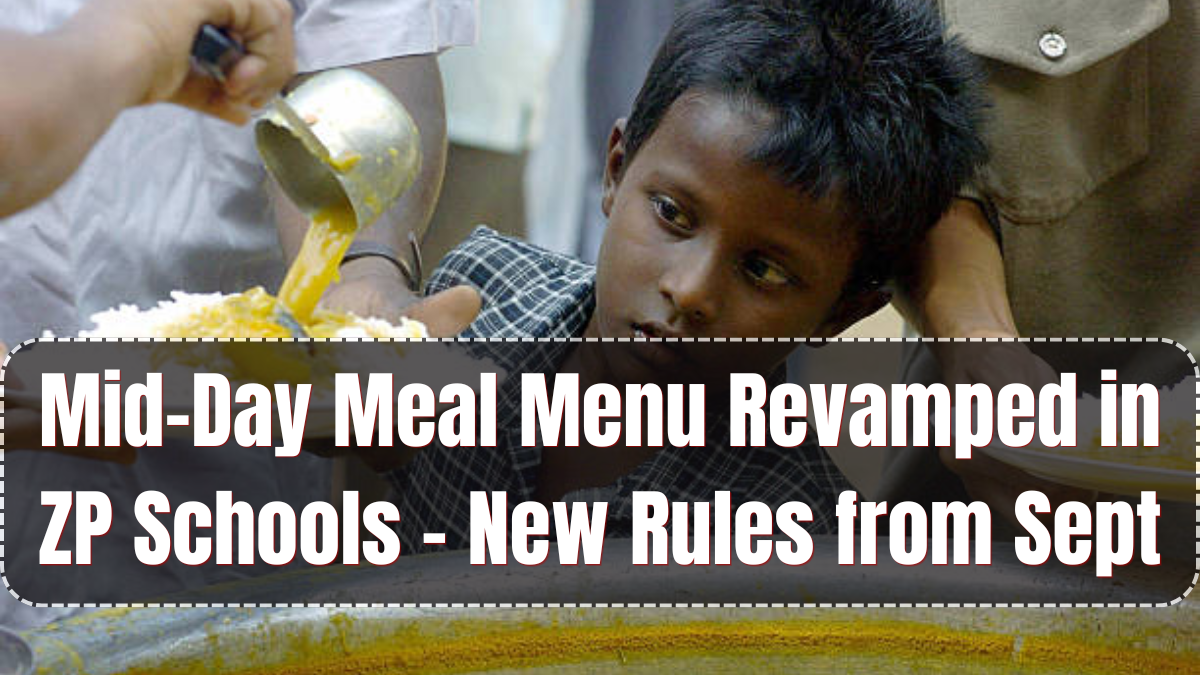In a major nutrition-focused move, the government has officially implemented a revised midday meal menu across all Zilla Parishad (ZP) schools from September 2025. This revamp is part of the National Programme of Mid-Day Meal in Schools, aiming to provide better quality meals to students and meet enhanced nutritional benchmarks. The new guidelines have already come into effect and are being uniformly followed across states.
With lakhs of school children dependent on the midday meal scheme for daily nourishment, this timely update ensures not just higher caloric value but also improved taste and dietary diversity. ZP school staff have received detailed instructions and training to adopt the new format without delay.

Key Features of the 2025 Mid-Day Meal Menu
The revised meal plan is designed to meet age-specific dietary needs and boost energy levels and immunity among students. The menu is now standardised but allows region-wise customisation to include local produce. As per the school nutrition division, the new daily and weekly meal cycles now include:
-
Daily inclusion of pulses, green leafy vegetables, and seasonal fruits
-
Use of fortified rice with iron, folic acid, and vitamin B12
-
Two eggs per week for non-vegetarian districts, and milk or bananas as alternatives in others
-
Millet-based meals twice a week for added fibre and micronutrients
-
Festive-day additions such as sweet pongal, kheer, or halwa to improve meal appeal
This ensures every child receives approximately 500–700 kcal and 20 grams of protein per meal, as per the revised nutrition standards.
Monitoring and Hygiene Upgrades
Along with the new menu rollout, kitchen hygiene standards in school kitchens have been upgraded. All ZP schools have been instructed to:
-
Maintain separate hand-washing and utensil-washing stations
-
Display meal menus publicly on school walls
-
Use color-coded storage bins for raw and cooked food items
-
Follow mandatory food handler health checks every 3 months
To improve accountability, mid-day meal inspectors now use mobile apps to upload photos of meals served and verify compliance daily.
Role of Community Participation
The revamped midday meal system promotes local participation through School Management Committees (SMCs). These committees now review weekly meal plans and gather feedback from students and parents. Local farmers and women-led SHGs (Self Help Groups) have also been roped in to supply fresh produce, thereby improving meal quality and boosting the rural economy.
Parents have noted the visible improvement in children’s interest in school food, especially with the addition of fruits and occasional treats. The feedback is being used to tailor nutrition delivery even more effectively in rural and tribal regions.
Government’s Vision Behind the Revamp
This strategic overhaul of the midday meal program reflects the government’s mission to eliminate classroom hunger and address malnutrition in early education. With improved taste, variety, and nutritional content, the revised system is already showing early signs of success, with higher meal consumption and reduced absenteeism in ZP schools.
The Ministry of Education has committed to reviewing the program every quarter and making adjustments based on seasonal availability and regional feedback. This ongoing support helps sustain meal quality and ensures the longevity of the school nutrition mission.
FAQs
What are the major changes in the 2025 Mid-Day Meal Menu?
The new menu includes daily green vegetables, fortified rice, weekly millet-based meals, eggs or fruits, and festive sweet dishes for variety and nutrition.
Are these changes applicable across all schools?
Yes, the revised mid-day meal plan is mandatory in all Zilla Parishad (ZP) schools across India starting from September 2025.
What is the calorie and protein target per meal?
Each meal now provides approximately 500–700 kcal and 20 grams of protein, meeting the revised nutrition guidelines for school children.
Are any hygiene standards included in the new policy?
Yes, hygiene protocols such as hand-washing stations, kitchen inspections, and periodic health checks for meal handlers are part of the policy.
Who is responsible for implementing the changes?
Implementation is overseen by school principals, local School Management Committees, and food inspectors under the Ministry of Education.
